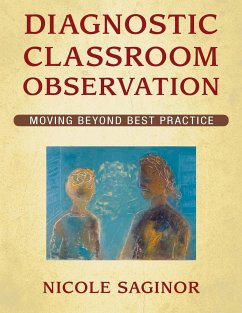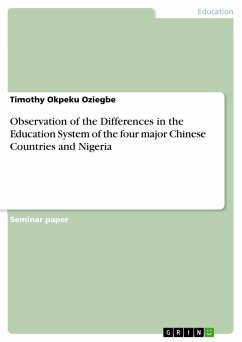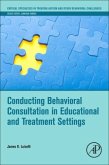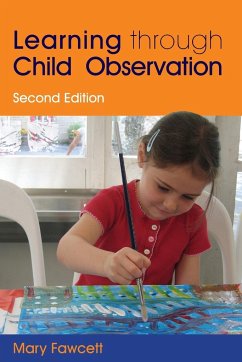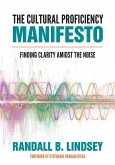- Broschiertes Buch
- Merkliste
- Auf die Merkliste
- Bewerten Bewerten
- Teilen
- Produkt teilen
- Produkterinnerung
- Produkterinnerung
A complete instructional leadership system for improving classroom practice! Based on the Vermont Classroom Observation Tool, diagnostic classroom observation (DCO) provides principals with guidance for the entire instructional supervision process, from preconference analysis to postconference follow-up. The model includes protocols for observing math/science and literacy instruction, criteria for recognizing exceptional teaching, and standards for determining classroom quality and student engagement. Readers will also find: Classroom observation forms to help identify instructor strengths and…mehr
Andere Kunden interessierten sich auch für
![Observation of the Differences in the Education System of the four major Chinese Countries and Nigeria Observation of the Differences in the Education System of the four major Chinese Countries and Nigeria]() Timothy Okpeku OziegbeObservation of the Differences in the Education System of the four major Chinese Countries and Nigeria27,95 €
Timothy Okpeku OziegbeObservation of the Differences in the Education System of the four major Chinese Countries and Nigeria27,95 €![Snowy Mountain Fire Observation Station Snowy Mountain Fire Observation Station]() Snowy Mountain Fire Observation Station19,99 €
Snowy Mountain Fire Observation Station19,99 €![Mental Illness in Prison: Recidivism Rates and Diagnostic Criteria Mental Illness in Prison: Recidivism Rates and Diagnostic Criteria]() Chemika Reed BurkhalterMental Illness in Prison: Recidivism Rates and Diagnostic Criteria47,99 €
Chemika Reed BurkhalterMental Illness in Prison: Recidivism Rates and Diagnostic Criteria47,99 €![Conducting Behavioral Consultation in Educational and Treatment Settings Conducting Behavioral Consultation in Educational and Treatment Settings]() James K. LuiselliConducting Behavioral Consultation in Educational and Treatment Settings40,99 €
James K. LuiselliConducting Behavioral Consultation in Educational and Treatment Settings40,99 €![Learning Through Child Observation Learning Through Child Observation]() Mary FawcettLearning Through Child Observation30,99 €
Mary FawcettLearning Through Child Observation30,99 €![La maladie mentale en prison : Taux de récidive et critères de diagnostic La maladie mentale en prison : Taux de récidive et critères de diagnostic]() Chemika Reed BurkhalterLa maladie mentale en prison : Taux de récidive et critères de diagnostic46,99 €
Chemika Reed BurkhalterLa maladie mentale en prison : Taux de récidive et critères de diagnostic46,99 €![The Cultural Proficiency Manifesto The Cultural Proficiency Manifesto]() Randall B. LindseyThe Cultural Proficiency Manifesto20,99 €
Randall B. LindseyThe Cultural Proficiency Manifesto20,99 €-
-
-
A complete instructional leadership system for improving classroom practice! Based on the Vermont Classroom Observation Tool, diagnostic classroom observation (DCO) provides principals with guidance for the entire instructional supervision process, from preconference analysis to postconference follow-up. The model includes protocols for observing math/science and literacy instruction, criteria for recognizing exceptional teaching, and standards for determining classroom quality and student engagement. Readers will also find: Classroom observation forms to help identify instructor strengths and weaknesses Scoring forms to assist with the final evaluation and review process Real-world vignettes that illustrate key indicators of quality teaching Guidance for introducing DCO into any school setting
Produktdetails
- Produktdetails
- Verlag: Corwin
- Seitenzahl: 202
- Erscheinungstermin: 22. Mai 2008
- Englisch
- Abmessung: 280mm x 216mm x 11mm
- Gewicht: 523g
- ISBN-13: 9781412955140
- ISBN-10: 1412955149
- Artikelnr.: 23485721
- Herstellerkennzeichnung
- Libri GmbH
- Europaallee 1
- 36244 Bad Hersfeld
- gpsr@libri.de
- Verlag: Corwin
- Seitenzahl: 202
- Erscheinungstermin: 22. Mai 2008
- Englisch
- Abmessung: 280mm x 216mm x 11mm
- Gewicht: 523g
- ISBN-13: 9781412955140
- ISBN-10: 1412955149
- Artikelnr.: 23485721
- Herstellerkennzeichnung
- Libri GmbH
- Europaallee 1
- 36244 Bad Hersfeld
- gpsr@libri.de
Nicole Saginor is a former superintendent in Vermont, leading a school district through the School Improvement Grant process as directed by NCLB. She is the principal developer of the Vermont Classroom Observation Tool (VCOT), which was used by Mathematica Policy Research, Inc. in two national studies funded by the US Department of Education to measure teacher performance. In her book, Diagnostic Classroom Observation, she develops the VCOT further and gives vivid images of how good teaching actually looks in real classroom settings. With examples of how to create valid assessments, recognize equity in the classroom, and speak to teachers in a post-conference, she assists school leaders in getting real results from their supervisory practice. Her work has attracted both national and international attention. She currently consults and is currently working with the Ministry of Education in Kosovo to develop their new teacher performance assessment system.?? Saginor has spent her 42-year career in education as a teacher, curriculum coordinator, principal, superintendent author and researcher. She was the associate executive director at Vermont Institutes, a nonprofit professional development organization where, for eight years, she directed a number of statewide initiatives to strengthen leadership in the state, providing training and professional development to school leaders, along with opportunities for networking and support. She brought national leaders such as Rick Dufour, Willard Daggett, Jonathan Kozol, Andy Hargreaves, Charlotte Danielson, and Meg Wheatley to interactive leadership forums in Vermont to create a culture of collaborative leadership. ??She has trained researchers for several national research studies in classroom observation for the collection of data on professional practice and the impact of specific programs of teacher preparation, induction, and pedagogical practices. She received her doctorate in educational leadership and policy studies at the University of Vermont and holds a master¿s degree in French literature from Boston University. She offers One-day speaking engagements, two to five day workshops and onsite coaching for administrators and teachers. www.nicolesaginor.com • Speaking Topics: ¿ Implementing the Common Core through supervision and evaluation of instruction ¿ Leading School Improvement ¿ Evaluating Instruction in Literacy ¿ Evaluating Instruction in Math and Science?Evaluating Instruction in Technology ¿ Formative Assessment ¿ New Practices to Enhance Teacher Evaluation ¿ Equity and Classroom Culture
Preface
The Structure of the Observation Tool
Acknowledgments
About the Author
1. Defining the "Technology of Good Instruction"
Assumptions Underlying DCO
Intended Uses
Final Thoughts Before Proceeding
2. Ending the "Process Versus Content" Argument
The Math/Science Version of Diagnostic Classroom Observation
The Implementation Criteria
The Content Criteria
The Classroom Culture Criteria: Using the Math/Science Version
Discussion Questions
Concluding Thoughts
3. Learning to Read and Reading to Learn
Section 1: Learning to Read
Section 2: Reading to Learn
Reading and Writing in the Content Areas
Section 3: Using the Literacy and Composite Versions
Discussion Questions
Concluding Thoughts
4. Classroom Culture: Treating Everyone as You Would Be Treated
The Classroom Culture Criteria
Applying the Classroom Culture Criteria
Concluding Thoughts on Equity of Access
5. Assessing Assessment
The Bullets: Characteristics of Good Assessment
Choosing the Right Assessment for What You Want to Know
Creating Valid Constructed Response Items
Learning to Assess Assessment
Concluding Thoughts
6. Putting It All Together
Examples: Why "Pretty Good" Is Not Good Enough
Putting It Together for Yourselves
Discussion Questions
Concluding Thoughts
7. Using Diagnostic Classroom Observation to Improve Instruction in Your
School
Section 1: Learning to Use DCO
Section 2: Adding DCO to Your Supervisory Practice
Tools for the Principal
Introducing DCO to Your Teachers
Concluding Thoughts
Appendix A. Questions for the Preconference: Math/Science Version
Appendix B. Questions for the Preconference: Literacy Version
Appendix C. The Math/Science Version
Appendix D. The Literacy Version
Appendix E. The "Cross-Walks"
Appendix F. The Score Sheets
Appendix G. The "Cheat Sheets"
Reference
Index
The Structure of the Observation Tool
Acknowledgments
About the Author
1. Defining the "Technology of Good Instruction"
Assumptions Underlying DCO
Intended Uses
Final Thoughts Before Proceeding
2. Ending the "Process Versus Content" Argument
The Math/Science Version of Diagnostic Classroom Observation
The Implementation Criteria
The Content Criteria
The Classroom Culture Criteria: Using the Math/Science Version
Discussion Questions
Concluding Thoughts
3. Learning to Read and Reading to Learn
Section 1: Learning to Read
Section 2: Reading to Learn
Reading and Writing in the Content Areas
Section 3: Using the Literacy and Composite Versions
Discussion Questions
Concluding Thoughts
4. Classroom Culture: Treating Everyone as You Would Be Treated
The Classroom Culture Criteria
Applying the Classroom Culture Criteria
Concluding Thoughts on Equity of Access
5. Assessing Assessment
The Bullets: Characteristics of Good Assessment
Choosing the Right Assessment for What You Want to Know
Creating Valid Constructed Response Items
Learning to Assess Assessment
Concluding Thoughts
6. Putting It All Together
Examples: Why "Pretty Good" Is Not Good Enough
Putting It Together for Yourselves
Discussion Questions
Concluding Thoughts
7. Using Diagnostic Classroom Observation to Improve Instruction in Your
School
Section 1: Learning to Use DCO
Section 2: Adding DCO to Your Supervisory Practice
Tools for the Principal
Introducing DCO to Your Teachers
Concluding Thoughts
Appendix A. Questions for the Preconference: Math/Science Version
Appendix B. Questions for the Preconference: Literacy Version
Appendix C. The Math/Science Version
Appendix D. The Literacy Version
Appendix E. The "Cross-Walks"
Appendix F. The Score Sheets
Appendix G. The "Cheat Sheets"
Reference
Index
Preface
The Structure of the Observation Tool
Acknowledgments
About the Author
1. Defining the "Technology of Good Instruction"
Assumptions Underlying DCO
Intended Uses
Final Thoughts Before Proceeding
2. Ending the "Process Versus Content" Argument
The Math/Science Version of Diagnostic Classroom Observation
The Implementation Criteria
The Content Criteria
The Classroom Culture Criteria: Using the Math/Science Version
Discussion Questions
Concluding Thoughts
3. Learning to Read and Reading to Learn
Section 1: Learning to Read
Section 2: Reading to Learn
Reading and Writing in the Content Areas
Section 3: Using the Literacy and Composite Versions
Discussion Questions
Concluding Thoughts
4. Classroom Culture: Treating Everyone as You Would Be Treated
The Classroom Culture Criteria
Applying the Classroom Culture Criteria
Concluding Thoughts on Equity of Access
5. Assessing Assessment
The Bullets: Characteristics of Good Assessment
Choosing the Right Assessment for What You Want to Know
Creating Valid Constructed Response Items
Learning to Assess Assessment
Concluding Thoughts
6. Putting It All Together
Examples: Why "Pretty Good" Is Not Good Enough
Putting It Together for Yourselves
Discussion Questions
Concluding Thoughts
7. Using Diagnostic Classroom Observation to Improve Instruction in Your
School
Section 1: Learning to Use DCO
Section 2: Adding DCO to Your Supervisory Practice
Tools for the Principal
Introducing DCO to Your Teachers
Concluding Thoughts
Appendix A. Questions for the Preconference: Math/Science Version
Appendix B. Questions for the Preconference: Literacy Version
Appendix C. The Math/Science Version
Appendix D. The Literacy Version
Appendix E. The "Cross-Walks"
Appendix F. The Score Sheets
Appendix G. The "Cheat Sheets"
Reference
Index
The Structure of the Observation Tool
Acknowledgments
About the Author
1. Defining the "Technology of Good Instruction"
Assumptions Underlying DCO
Intended Uses
Final Thoughts Before Proceeding
2. Ending the "Process Versus Content" Argument
The Math/Science Version of Diagnostic Classroom Observation
The Implementation Criteria
The Content Criteria
The Classroom Culture Criteria: Using the Math/Science Version
Discussion Questions
Concluding Thoughts
3. Learning to Read and Reading to Learn
Section 1: Learning to Read
Section 2: Reading to Learn
Reading and Writing in the Content Areas
Section 3: Using the Literacy and Composite Versions
Discussion Questions
Concluding Thoughts
4. Classroom Culture: Treating Everyone as You Would Be Treated
The Classroom Culture Criteria
Applying the Classroom Culture Criteria
Concluding Thoughts on Equity of Access
5. Assessing Assessment
The Bullets: Characteristics of Good Assessment
Choosing the Right Assessment for What You Want to Know
Creating Valid Constructed Response Items
Learning to Assess Assessment
Concluding Thoughts
6. Putting It All Together
Examples: Why "Pretty Good" Is Not Good Enough
Putting It Together for Yourselves
Discussion Questions
Concluding Thoughts
7. Using Diagnostic Classroom Observation to Improve Instruction in Your
School
Section 1: Learning to Use DCO
Section 2: Adding DCO to Your Supervisory Practice
Tools for the Principal
Introducing DCO to Your Teachers
Concluding Thoughts
Appendix A. Questions for the Preconference: Math/Science Version
Appendix B. Questions for the Preconference: Literacy Version
Appendix C. The Math/Science Version
Appendix D. The Literacy Version
Appendix E. The "Cross-Walks"
Appendix F. The Score Sheets
Appendix G. The "Cheat Sheets"
Reference
Index

